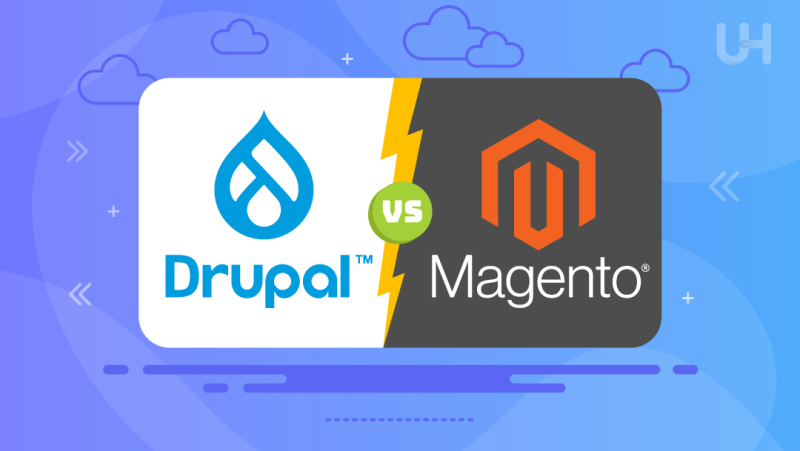One of the most important decisions in creating a business website is choosing the right content management system or e-commerce platform. From the top choices, one has to choose between Drupal vs Magento, now known as Adobe Commerce. While both are robust systems, they serve different needs. Understanding their distinctive features and functionalities is important before making a final decision.
In this article, we will provide a comprehensive comparison between Drupal and Magento, highlighting their features and capabilities to help you determine which platform best meets your specific needs.
Understanding Drupal and Drupal Commerce
Drupal is a full-blown CMS that any e-commerce enterprise portal like WordPress may empower. In addition to easy blogs, it even possesses complex corporate sites important factor is its robust development upon modular designs and formidable taxonomy systems, allowing heavies to customize to scalability potential by leveraging open source. Developers give support by contributing to the platform. Hence, it, keeps Drupal from which modern alternatives can be conceived online in building eCommerce platforms effectively or without many hiccups.
On the other hand, Drupal Commerce is an extension of Drupal. It integrates commerce capabilities within the content management system, allowing users to harness the robust features of content management and e-commerce capabilities. With the integration of Drupal, Drupal Commerce was made from scratch. As a result, it seamlessly fits into the profound capabilities of the Drupal CMS. This is not an afterthought addition but a complete e-commerce solution.
Primary Features Of Drupal
Drupal is a reliable CMS that provides a strong foundation for creating and managing websites. Here are its primary features.
- User-Friendly Content Creation: Drupal features an intuitive interface that simplifies the content creation process.
- Front-End Builder: This simple drag-and-drop builder allows you to easily edit the website’s layout.
- Effective SEO Tools: Drupal provides various tools for managing keywords, generating sitemaps, measuring performance, and optimizing your website.
- Advanced Security: Drupal consistently releases security updates to ensure 24/7 protection against threats like cross-site scripting and brute force attacks.
- Streamlined Workflow Management: Various reliable tools are available to help manage content changes and establish a smooth verification process.
- Multi-Language Support: Drupal supports over 100 languages, making it easier to translate landing pages, posts, contact forms, and more.
Advantages of Drupal
- Customizable Options: Drupal is highly customizable right from the start. Using content types, you can create complex data structures.
- User Friendly: It’s also very coder-friendly, allowing for the rapid development of complex websites with only basic programming knowledge.
- Enhanced Security: Drupal regularly releases security patches and bug fixes to safeguard websites against malicious attacks.
- Community: The Drupal community is robust, with an exceptional support team made up of talented individuals from around the world.
- Additional Services: Drupal can extend its services to other platforms through APIs, which can enhance front-end team workflows.
Limitation of Drupal
- Steep Learning Curve: Drupal has a significant learning curve, which may be challenging for new users.
- Lack of Backward Compatibility: It does not support backward compatibility before Drupal 8, making updates—such as from Drupal 6 to 7—cumbersome.
- Performance Concerns: Drupal runs a lot of code on a single website. Without proper optimization, this can lead to bloating, significantly increasing load times and resource consumption.
What is Magento (Adobe Commerce)?
Magento is a feature-rich eCommerce platform that is now part of Adobe Commerce. It enables online merchants to have the most control over their online stores’ appearance, content, and functions. Magento is the choice for leading large-scale online retailers primarily due to its rich functionality, scalability, and dependability.
Magento 2, or Adobe Commerce, brings noticeable improvements compared to its predecessor. The performance is better, smoother customization processes are implemented, and the code base is better. On top of that, consider using a trustworthy SSL certificate with Adobe Commerce for more advanced security features and native B2B functionality to offer a robust solution for just about any e-commerce need.
Primary Features of Magento (Adobe Commerce)
The features provided by Magento (Adobe Commerce) are advanced and versatile. Some core features of Adobe Commerce include:
- Multi-Store Functionality: Adobe Commerce enables the management of multiple online stores from a single installation, facilitating business expansion.
- Customizable Design: It offers various design options and templates for creating a unique storefront that aligns with your brand.
- Product Catalog Management: Easily manage product catalogs, including adding new items, creating categories, and price optimization features.
- Search Engine Optimization: Features, such as meta tags, off-page SEO, and SEO-friendly URLs, assist in optimizing stores for search engines.
- Marketing and Promotions: Equipped with tools for email campaigns, coupon codes, and targeted promotions to attract and retain customers.
- Analytics and Reporting: Provides insights into store performance through comprehensive analytics and reporting tools.
Advantages of Magento (Adobe Commerce)
- High Scalability and Performance: Magento excels in managing large product catalogs and handling high traffic volumes. Its architecture is designed to scale, ensuring that your online store can grow seamlessly as your business expands.
- Strong Built-in Features: Magento offers a comprehensive set of built-in features, including inventory management, advanced SEO, and various marketing tools. This extensive feature set reduces the need for numerous third-party integrations.
- Best for Complex eCommerce Operations: If you operate a diverse product catalog, manage multiple storefronts, or serve B2B customers, Magento’s features are tailored to effectively meet your requirements.
Limitations of Magento (Adobe Commerce)
- Steeper Learning Curve: Magento’s advanced features result in a steeper learning curve than other platforms, which may require additional time and resources for training.
- Higher Initial Cost: Although Magento provides a free, open-source version, there are costs associated with hosting, development, and possibly premium extensions. This can lead to a significant initial investment.
Empower Your Online Store with Magento Hosting
Achieve seamless performance for your e-commerce website with Magento hosting from UltaHost. Designed for speed, security, and scalability, it’s the perfect choice to grow your online presence and deliver exceptional user experiences.
Drupal vs Magento: Detailed Comparison Table
| Features | Drupal | Magento (Adobe Commerce) |
| Customization | Extensive customization through modules. Integrates e-commerce with content strategies. | The high degree of customization tailored for eCommerce with themes and extensive extensions. |
| Performance | Handles high traffic and large content volumes effectively. | Optimized for large-scale eCommerce operations. Supports extensive product catalogs and high customer concurrency. |
| Community Support | Supported by a large and active community. Many modules and themes are available. | Robust community with a wide range of dedicated e-commerce plugins and themes. |
| Cost Effectiveness | Open-source with potential costs for advanced customizations and expert developers. | Free Community version available. The enterprise version offers extra features but at a higher cost. |
| SEO and Marketing Tools | Advanced SEO capabilities can be enhanced with more modules. | Strong built-in SEO features and advanced marketing tools like promotions and coupon management. |
| Security | Regularly updated for security by the community. | Robust security features. Adobe Commerce has more enterprise-level security measures. |
Drupal vs Magento: Customization and Flexibility
Drupal’s flexibility allows the developer or designer to create highly distinctive individual sites. That comes with a vast library of modules and themes that the users can use to fit into the various functionalities and styles the needs and industries would dictate.
At the same time, Magento offers some customization but is focused mainly on e-commerce solutions. Such concentration on online retail could make this application less versatile for projects outside of commerce.
Performance Between Drupal and Magento
Drupal can handle high loads and a huge volume of content, which is appropriate for a website with a large number of users and complex content management. Its architecture is flexible and allows the use of robust caching mechanisms to ensure performance remains stable and responsive even at peak times, thus allowing organizations to deliver a seamless user experience.
On the other hand, Magento was explicitly developed for big-scale eCommerce operations, managing numerous product catalogs and concurrently serving a huge number of clients. The platform is packed with features aimed at enriching online shopping experiences, including advanced search capabilities, marketing personalization, and robust inventory management.
Drupal vs Magento: Which Has Best Community Support?
Drupal has the backing of a large, active community and boasts a rich ecosystem of modules and themes. This extended support makes it easier for users to customize and expand their websites with the many available options.
Yet, at the same time, Magento has a staunch, specifically targeted eCommerce community. In contribution to that, this great community has been developing versatile specific Magento themes and plugins supplying increasingly nuanced solutions for online companies wishing to perform well in open rivalry conditions.
Magento vs Drupal: Cost and Expense Comparision
Magento offers a Community version for free, which is good enough to get any e-commerce project underway and fits any budget for companies trying to spend as little money as possible. In turn, the enterprise version costs money to provide more functionality for enterprises with specific needs.
Drupal is a highly featured, free, open-source content management system that allows flexibility in making any desirable customizations and enhancements. It is free to use, though a business may incur costs when implementing an advanced level of customization or hiring expert developers to exploit the capabilities of this featured platform.
SEO and Marketing Tools Breakdown

Several SEO modules are available in Drupal. These modules are intended to extend the functionality of a website for better search engine optimization. You can access and install them on the official Drupal site. They provide necessary tools, such as Google Analytics integration, a meta-tag management system, and a robots.txt generator, among others, to optimize your website’s visibility.
On the other hand, Magento has highly flexible SEO and marketing tools that are tailored according to one’s business needs. No-follow links, permalinks, meta tags, and URL changes are customizable according to users’ needs. There are many options here that will help improve search engine performance and optimize customer engagement.
Best Security Features Between Drupal vs Magento
Security is paramount for any e-commerce enterprise, given the sophistication of cyber fraud and DDOS attacks. Thankfully, Drupal is among the safest and most secure for e-commerce. Every version of Drupal is released with security updates that patch security vulnerabilities such as cross-site scripting, SQL injection, and cross-site request forgeries. Open-source software is a big plus for developers because they can install any security module and change the code. Still, they should be very careful because about 42% of Drupal security vulnerabilities relate to XSS problems and 14% concern code execution.
Over the past years, Magento’s security patches have improved incredibly. Version 1 of Magento was susceptible to any DDoS attack and could not protect all of its customers’ data. However, Magento 2 has enacted multiple security measures, stronger hashing algorithms in password management, and better prevention of XSS. More interestingly, Magento regularly publishes new security patches for any vulnerability on an online Magento website.
When to Choose Drupal
Drupal is the perfect choice when developing content-driven websites that require complex eCommerce UX or those projects needing detailed user role management. Besides, Drupal best fits organizations requiring high scalability and performance. For hosting your Drupal-based websites more efficiently, Virtual Private Server Hosting is the best way to improve the performance and flexibility of your website.
Use cases of Drupal
Here are some examples and use cases of Drupal which include:
- Educational platforms
- Corporate websites
- Media and publishing websites
When to Choose Magento (Adobe Commerce)
Magento is the perfect solution for those businesses that focus on e-commerce and need strong product management. It is also good for companies that want to expand their businesses globally since it supports multiple languages, which means reaching a wide variety of markets will be easier. To get the most out of your Magento store in terms of performance and to ensure it is always up, you really need to host it on specialized eCommerce web hosting.
Use Cases of Magento (Adobe Commerce)
The following are some examples and use cases of Magento 2:
- Retail businesses.
- Online marketplaces.
- Subscription-based services.
Conclusion
When deciding between Drupal vs Magento, it’s important to consider your specific business requirements. Drupal is best for content-heavy projects, offering a flexible framework for managing and delivering diverse content types. On the other hand, if your primary goal is to create a powerful and scalable online store, Magento (Adobe Commerce) is the preferable option, providing extensive e-commerce capabilities and features tailored for retail success.
Take your website’s performance to the next level! For seamless performance and reliability, Drupal hosting from UltaHost ensures your site runs smoothly with optimized speed and security tailored to Drupal’s requirements.
FAQ
Which platform is better for SEO, Drupal or Magento?
Both platforms offer excellent SEO tools, but Drupal is better for content-heavy websites, while Magento excels in product-specific optimizations.
Can I use Drupal and Magento together?
Yes, you can integrate Drupal and Magento for content-rich e-commerce websites.
Is Magento suitable for small businesses?
Magento Open Source can work for small businesses, but the enterprise version may be cost-prohibitive.
Does Drupal support e-commerce?
Yes, Drupal can support e-commerce using modules, but it’s not as robust as Magento.
What hosting is best for Drupal and Magento?
Dedicated Hosting is ideal for high-performance needs, while VPS Hosting suits medium-scale projects.
Is Magento more secure than Drupal?
Both are highly secure when properly configured. Magento focuses on transaction security, while Drupal excels in data protection.
Which platform is easier for beginners?
Neither is beginner-friendly; both require technical knowledge for advanced functionalities.









